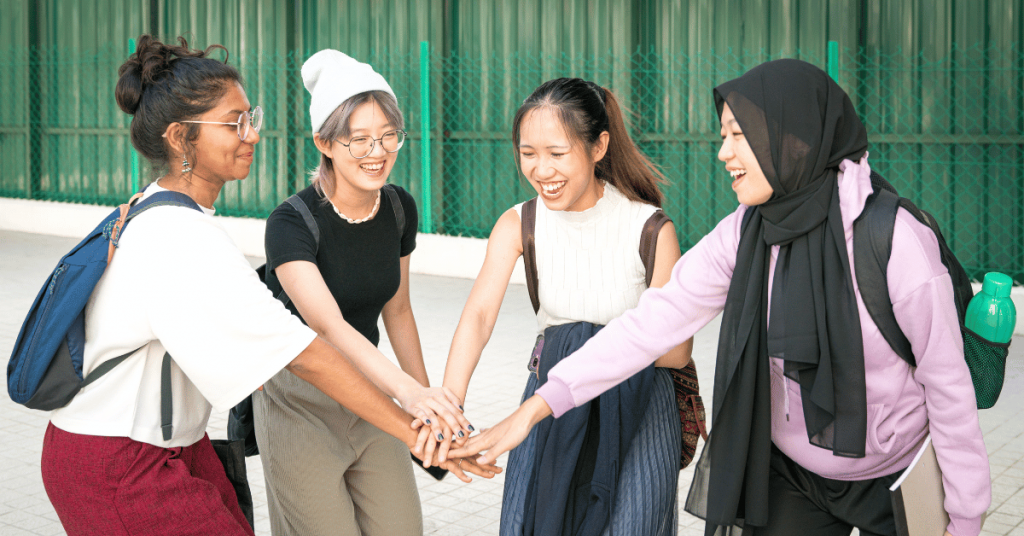Are you an Indian student studying abroad, eager to make connections, explore new interests, and expand your horizons?
Joining clubs and organisations is the perfect way to immerse yourself in the vibrant student community and make the most of your international experience.
Studying abroad can sometimes feel overwhelming, especially when you’re far from home. Joining clubs and organisations specifically tailored for Indian students can provide a sense of community, comfort, and familiarity.
And, participating in diverse groups can help you broaden your perspective, develop new skills, and create lifelong friendships.
So if you’re seeking to connect with like-minded individuals, celebrate your cultural heritage, and engage in activities aligned with your interests, joining clubs and organisations is a fantastic avenue to explore.
It allows you to maintain a connection to your Indian roots while embracing the opportunities presented by your international educational journey.
Let’s delve into the details of clubs and organisations available for Indian students abroad.
Importance of Joining Clubs and Organisations

Joining clubs and organisations in the university/college environment is essential for students. Here are the reasons why:
1. Significance in the College Environment
Clubs and organisations provide students with a platform to engage in extracurricular activities and explore their interests outside of academics. They contribute to a vibrant and dynamic campus life, fostering a sense of community and belonging among students.
Clubs often align with specific fields of study or disciplines, allowing students to apply classroom knowledge in practical settings and gain a deeper understanding of their chosen field. These groups create opportunities for leadership roles, event planning, and collaboration, enhancing students’ organisational and teamwork skills.
Clubs and organisations often collaborate with academic departments or industry professionals, facilitating networking opportunities, internships, and potential career prospects.
2. Building a Sense of Community and Fostering Friendships
Clubs play a crucial role in building a sense of community within the university/college environment, connecting like-minded individuals with similar interests or goals.
They provide a social support network, creating members’ sense of belonging and camaraderie.
Students can interact with peers from diverse backgrounds by participating in club activities, promoting cultural exchange and understanding. Clubs organise social events, workshops, and outings, creating opportunities for students to form lasting friendships and connections beyond the classroom.
3. Opportunities for Personal and Professional Growth
Joining clubs and organisations offers a platform for personal growth and self-discovery. Students can explore new hobbies, develop new skills, and gain confidence in their abilities. Clubs often provide training sessions, workshops, and mentorship opportunities, allowing students to enhance their professional skills and gain valuable experience.
Club leadership roles enable students to develop organisational, communication, and problem-solving skills, preparing them for future career endeavours. Club involvement can provide a competitive edge when applying for jobs or graduate programs, demonstrating a commitment to personal growth, teamwork, and community engagement.
Types of Clubs and Organisations

Indian students who study abroad are provided with a diverse range of clubs and organisations to participate in. Here are some examples of clubs and organisations that Indian students can join while studying overseas:
1. Academic and Professional Clubs
Various academic clubs are available, catering to fields such as engineering, commerce, computer science, and medicine. These clubs organise workshops, seminars, and competitions related to their respective disciplines, fostering academic growth and providing networking opportunities.
Professional clubs are geared towards career development and industry exploration. They often invite guest speakers, organise career fairs, and facilitate internships or mentorship programs to help students gain practical knowledge and connections in their desired fields.
2. Cultural and Diversity Clubs
These clubs celebrate the rich cultural heritage of India and promote cross-cultural understanding. Indian cultural clubs organise events, festivals, and performances showcasing Indian traditions, cuisine, dance, and music. International cultural clubs encourage cultural exchange and appreciation among students from various backgrounds.
3. Sports and Recreational Clubs
Sports clubs enable Indian students to participate in a variety of sports, including cricket, football, badminton, and basketball, either competitively or recreationally. These organisations provide training sessions, friendly matches, and tournaments to promote physical health, teamwork, and a feeling of community.
4. Volunteer and Community Services
These organisations are dedicated to giving back to their communities through volunteerism and social impact programmes. Indian students can participate in activities such as teaching, fundraising, environmental conservation, and organising charity events, allowing them to contribute constructively and make a difference in their new surroundings.
Challenges Faced by Indian Students Abroad

When Indian students choose to pursue their education abroad, they encounter a variety of distinctive obstacles that can significantly influence their overall experience. These challenges revolve around two key aspects:
1. Cultural Differences

Adjusting to a new cultural environment can be overwhelming for Indian students. They find themselves immersed in unfamiliar social norms, values, and methods of communication. As a result, they may feel disoriented and frustrated as they navigate these differences, trying to adapt and integrate into their new surroundings.
2. Language Barriers

Language can pose a significant hurdle for Indian students studying in countries where English is not the primary language. Communicating effectively becomes challenging, affecting their ability to participate in academic and social activities actively. Consequently, they may experience feelings of isolation, and their academic performance may suffer as a result.
3. Homesickness

Being away from home and family for an extended period can evoke a sense of homesickness in Indian students. They may miss the familiarity of their culture, food, festivals, and social support networks, which can contribute to feelings of loneliness and melancholy.
Tips for Finding and Joining Clubs in College / University

Finding and joining relevant clubs and organisations is an exciting part of the university/college experience. Here are some tips and strategies to help Indian students in their search:
1. Utilise University Resources
Check the student union or student affairs office for a comprehensive list of clubs and organisations available on campus. They often maintain updated information about various groups.
Explore the university’s official website, specifically the student life section, which may have a directory or database of clubs and their descriptions. And pay attention to bulletin boards around campus where clubs often advertise their activities, upcoming events, and contact information.
2. Attend Club Fairs and Events
Club fairs are a great opportunity to learn more about different organisations. These events gather clubs in one location, allowing students to interact with club members, ask questions, and sign up for mailing lists to stay updated.
Attend club activities and information sessions throughout the year. These include the club’s activities, aims, and membership criteria. It also allows students to meet current members and assess their fit with the club’s objectives.
3. Consider Personal Interests, Goals, and Cultural Bonding
Reflect on personal interests, hobbies, and passions when searching for clubs. Consider joining clubs related to academic pursuits, cultural affiliations, sports, arts, community service, or any other area of interest.
Evaluate personal goals and objectives. Determine whether joining a particular club aligns with these goals and if it provides opportunities for growth, networking, or skill development.
Take cultural affiliations into account. Joining clubs that celebrate Indian culture or offer a space for connecting with fellow Indian students can provide a sense of familiarity and support.
What Benefits Do You Get for Club Involvement?

Actively participating in clubs and organisations offers numerous benefits for Indian students studying abroad. These benefits include:
1. Skill Development and Enhancing Employability
Clubs provide opportunities for skill development beyond the academic setting. Students can develop transferable skills such as communication, problem-solving, time management, and organisational skills.
Club involvement allows students to gain practical experience related to their field of interest, enhancing their employability and making them more competitive in the job market.
Students can refine their leadership abilities, adaptability, and creativity through club activities, which employers highly value.
2. Networking Opportunities and Industry Exposure
Clubs often collaborate with professionals, industry experts, and alumni, offering networking opportunities and exposure to the industry.
Attending guest speaker sessions, industry visits, or networking events organised by clubs can help students make valuable connections, learn about career pathways, and gain insights into specific industries or professions.
3. Building Leadership and Teamwork Skills
Active club participation provides opportunities to take on leadership roles, such as serving as club officers or committee members.
Leading club projects and organising events allow students to develop leadership skills, including decision-making, delegation, and conflict resolution. And collaborating with diverse team members within the club fosters teamwork, cooperation, and the ability to work effectively in a group setting.
Follow These Tips for Overcoming Barriers and Integration

Joining clubs and organisations may present some barriers for Indian students studying abroad. These barriers can include:
- Language barriers: Limited proficiency in the primary language spoken in the host country can hinder effective communication and participation in club activities.
- Cultural differences: Indian students may encounter unfamiliar cultural norms, customs, and social dynamics within clubs and organisations, which can create initial feelings of discomfort or exclusion.
- Lack of familiarity: Being new to the university or college environment, Indian students may struggle to find and join clubs, resulting in uncertainty and hesitation.
To overcome these barriers, the following strategies can be helpful:
- Language support: Seek language support resources the university offers, such as language tutoring, conversation partners, or language exchange programs. Practise the host country’s language regularly to improve proficiency and gain confidence in communication.
- Cultural orientation: Attend cultural orientation sessions or workshops offered by the university or international student services to familiarise oneself with the host country’s customs, traditions, and social norms. This can help in navigating cultural differences within clubs and organisations.
- Engage in intercultural communication: Actively engage with club members and be open to learning about different cultural perspectives. Respectfully ask questions, listen attentively, and demonstrate curiosity about others’ cultures and experiences.
Suggestions for integrating with diverse student groups include

1. Attend club events and meetings regularly
Actively participate in club activities and events to establish connections and build relationships with fellow members.
2. Volunteer for club responsibilities
Offer to assist with event planning or to take on leadership duties within the club. This participation encourages teamwork and allows for greater integration within the group.
3. Look for diversity-focused clubs
Join clubs that encourage diversity and inclusion. These groups frequently have a broad membership and offer a friendly environment for students from varied backgrounds to interact and engage.
4. Take part in cultural exchange activities
Attend cultural exchange events or initiatives hosted by groups. This enables the exchange of Indian culture while also learning about the host nation’s culture.
Overcoming Homesickness and Fostering a Supportive Environment

Joining clubs and organisations can be instrumental in combating homesickness for Indian students studying abroad. Here’s how:
1. Sense of Belonging
Clubs and organisations provide a sense of community and belonging, creating a supportive network of like-minded individuals. Engaging in club activities allows students to form new friendships and connections, easing feelings of loneliness and homesickness.
2. Shared Interests
Joining clubs based on personal interests allows students to engage in activities they enjoy, diverting their attention from homesickness. Shared passions and hobbies within the club foster a sense of fulfilment and help students feel more at home in their new environment.
3. Distraction and Engagement
Active club involvement keeps students occupied and engaged, reducing their time dwelling on homesickness. Club events, meetings, and projects provide a sense of purpose and contribute to a fulfilling study abroad experience.
4. Creating a Support Network
Clubs often function as a support system, offering emotional support, guidance, and mentorship from fellow members. This supportive network can provide a sense of security and comfort, mitigating feelings of homesickness.
5. Inclusivity and Acceptance
Clubs prioritise inclusivity and celebrate diversity. They foster an environment where all students, including Indian students, feel accepted, respected, and valued for their unique perspectives and cultural backgrounds.
6. Peer Support and Empathy
Club members often understand the challenges faced by international students, including homesickness. This shared experience allows for empathetic connections and provides a safe space for open discussions and support.
Final Thoughts

We explored the unique difficulties, including cultural differences, language barriers, and homesickness, that Indian students may encounter. You are encouraged to explore and actively engage in clubs and organisations during their study abroad experience.
By doing so, Indian students can maximise their personal and academic growth, forge meaningful connections, and create lasting memories. Clubs offer a platform for discovering new interests, honing skills, and forming supportive networks.
They contribute to a well-rounded university experience, enriching student life beyond the academic sphere.
So, embrace the opportunities clubs provide, attend club fairs, and take the initiative to participate in activities that align with your passions. By immersing yourself in club involvement, you can make the most of your study abroad journey and create lifelong connections and experiences.


Frequently Asked Questions
Are there any clubs or organisations for Indian students?
Yes, many colleges have cultural groups that highlight Indian culture and provide a platform for Indian students to connect.
These groups host events, festivals, and activities that help you to stay connected to your culture while studying abroad.
How can I overcome language barriers and cultural differences in clubs?
Seek language support resources offered by the university to improve language proficiency.
Attend cultural orientation sessions and engage in intercultural communication to better understand and navigate cultural differences.
What are the benefits of joining clubs and organisations?
Joining clubs provides opportunities for skill development, enhancing employability, and building leadership and teamwork skills.
It offers networking opportunities, industry exposure, and access to professionals in your field of interest.





Comments (0)